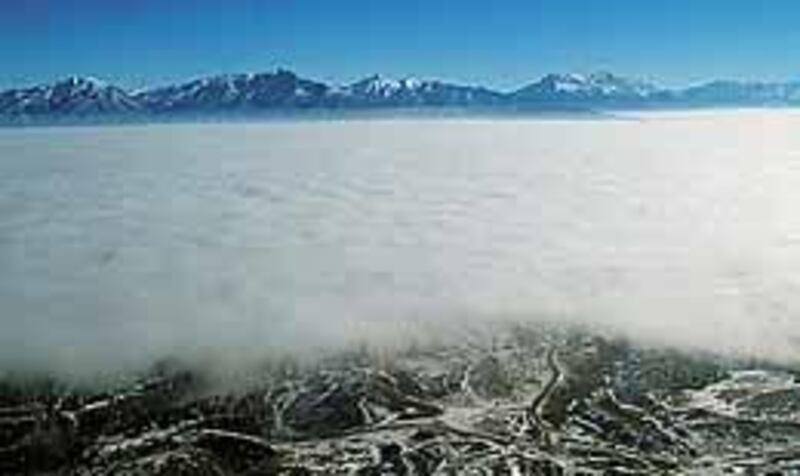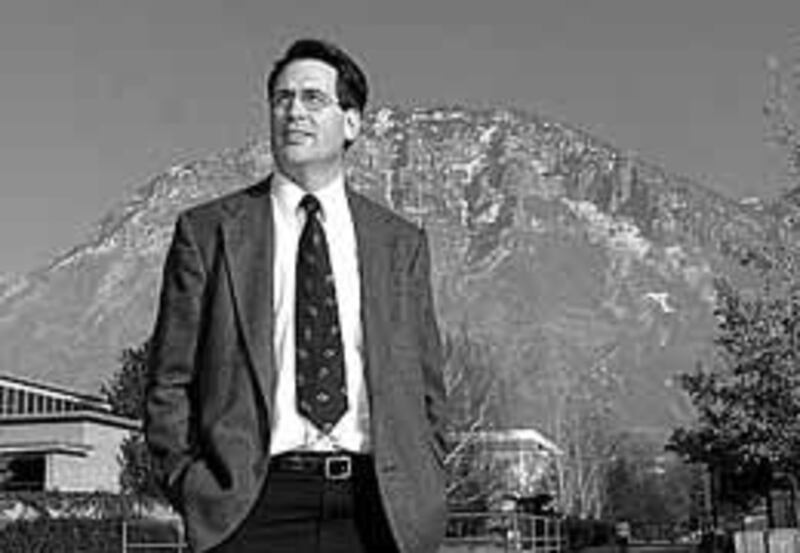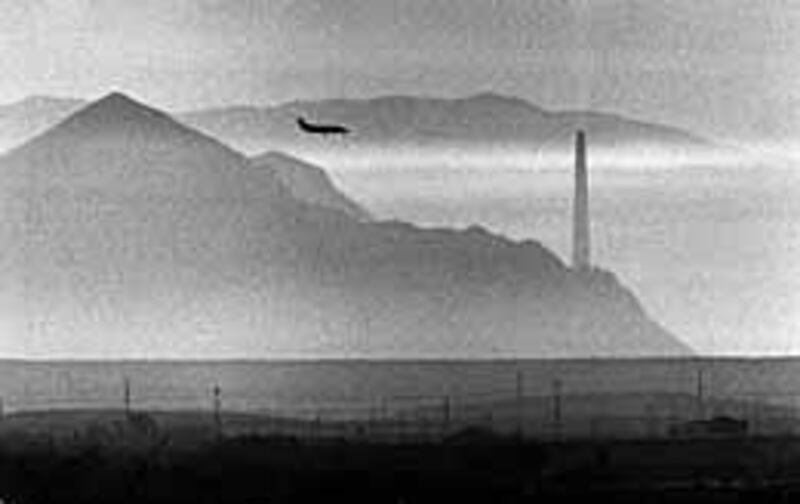Ignore the suffocating winter inversions for a moment, take a deep breath and consider what may seem improbable: The air in Utah is cleaner than it has been in decades.
Not only that, the water is safer to drink and the lands are less polluted.
As toxic as Utah's environment is, scientists are quick to point out that today's environment is better, in some cases far better, than it was two or three decades ago.
And they point to myriad environmental laws, most passed in the mid-1970s over the objections of industry, that established then-unprecedented limits on pollution. Those laws have been tweaked over the years, but they remain hallmarks of a radical shift in policy toward the environment.
"Personally, I believe most of the environmental legislation that passed, though I had concerns at the time, have proven workable," said U.S. Sen. Orrin Hatch, who participated in those environmental debates as a novice lawmaker in the early 1970s. "The Clean Air Act and Clean Water Act are clear successes, and wilderness, too."
But there have been failures, too.
Superfund, the program designed to clean up the nation's worst environmental disasters, has helped lawyers more than the envi-
ronment, insisted Hatch, R-Utah. And he's no fan of how the Endangered Species Act has been used to bludgeon private property owners.
"By and large, I think our environmental legislation has been on the plus side," he said.
Conservationists, while unified in their belief Congress hasn't done enough for the environment and has moved too slowly when it has, admit things are better than they were before passage of the 1970s laws.
But many conservationists wonder what the future holds. They are suspicious a new Republican administration may be too sympathetic to industry, and those fears are heightened by conservatives in Congress pledging major revisions to laws that have been hallmarks of environmental protection.
Voluntary compliance
The administration of environmental laws generally falls to state regulators under cooperative "primacy" agreements that allow for local enforcement. Those agreements mandate that states must have laws at least as stringent as the federal laws, but they can have tougher laws if they so choose.
Utah's approach has been simply to follow the letter of the federal law. "We don't have any indication there is a need (for stricter standards)," said Dianne Nielson, executive director of the Utah Department of Environmental Quality.
In recent years, Utah has taken a decidedly different approach to enforcement of environmental laws, one based largely on incentives that foster voluntary compliance.
"The best way (to achieve better environmental results) may not be to pass new laws but to work with business and industry to voluntarily make changes," Nielson said. One example of that, she said, is a successful state program that is cleaning up sites contaminated with hazardous materials.
Another example can be found at Magnesium Corp. of America's plant in remote Tooele County. Long labeled the nation's worst air polluter, according to the Environmental Protection Agency's Toxic Release Inventory, the company voluntarily plans to add a new "sealed cell" production unit that is much cleaner than its traditional production technology. In doing so, it will set the standard for magnesium refineries.
"That's why Magcorp is such a positive story for us," said Stephen Packham, DEQ toxicologist. "Their new cells are going to be so efficient, reduce chlorine emissions 90 to 95 percent."
But rank-and-file regulators inside the department, while supportive of the voluntary programs, are nonetheless skeptical of a statewide regulatory system built too much around voluntary compliance with environmental law. Only rarely does DEQ impose civil penalties or fines for noncompliance.
When it comes to filing the appropriate public disclosures or reporting dangerous leaks and spills, there are laws requiring industry to take certain actions. But who's to say if the law is ever followed?
In most cases, "We rely on the honesty and goodwill of industry," said one DEQ scientist. "We could be doing a lot more."
The air we breathe
One area where the state could be doing more is air pollution, more specifically the fine particulates that seep deep into the lungs where they cause respiratory ailments, said Brigham Young University professor C. Arden Pope, a national expert on air pollution and its costs to public health and the economy.
"If Utah does as little as it can get away with, then I see it as a problem," Pope said. "If not, we'll continue to have this ugly pollution along the Wasatch Front, and it will get worse," he said.
A pending U.S. Supreme Court decision, expected later this year, could allow the EPA to set tougher fine particulate standards for all states. Currently, the EPA requires state regulators to measure the fine particulate matter that causes poor visibility and threatens public health.
The focus of the summer air pollution problem is ozone, a harmful chemical reaction caused mostly by car fumes and heat. In the winter, microscopic particulate matter known as "PM2.5" is a concern.
But as bad as this winter has been and last summer was, "Utah's air has been much better the last 10 years than it was before that," insisted Bob Dalley, state director of air monitoring.
"The last decade or so we've done a pretty good job," Pope agreed. "Things have improved, and the state deserves credit for it. But I don't think we can say we're done with it, that (the problem) is over."
Dalley agrees, warning it will get worse in the years ahead. "Because of urban sprawl, increased population and the increased distance we drive, sometime within the next 10-year period the trend of improvement we see will have switched," he said.
That predicted trend, which is not unique to Utah, is why state and federal regulators are pushing hard to promote cleaner-burning vehicles, more mass transit and cleaner industry.
The years ahead portend major changes as more and more environmental mandates are passed down from Congress or from federal agencies like the EPA. Critics of mandates claim these changes will come with steep costs to consumers and taxpayers.
For example, local governments are now grappling with how to comply with federal standards limiting the amount of polluted rainwater that is allowed into storm drains. And farmers, dairymen and feedlot operators are faced with tough restrictions on pollution from fertilizers and animal wastes that wash into local waterways.
And recently, the Clinton administration approved new regulations that are expected to cut air pollution from heavy-duty trucks and buses by more than 90 percent over the next decade.
The Bush administration has put those regulations on hold pending further review. But if the new federal standards are approved, it will require new large trucks and buses to meet stringent tailpipe emission limits and direct refiners to produce virtually sulfur-free diesel fuel.
It is a standard not unlike the lead-free gasoline requirement implemented more than two decades ago for most motorists. And like the lead-free gas regulation, the new diesel rules come with plenty of grumbling, mostly from the trucking industry that warns increased costs will inevitably be passed along to consumers.
But not everyone is crying the blues. Lynette Phillips, Utah Department of Transportation spokeswoman, said it's too early to tell exactly how the new legislation will affect the state. "If it does impact us, we'll have to deal with it," she said. "Anything that will help the environment, we're in favor of."
It's a gas
The diesel regulation could have positive effects beyond less sulfur in the air.
The higher costs of the sulfur-free diesel fuel could prompt companies, especially those with large fleets of smaller trucks, to look more at converting to natural gas vehicles, a much cleaner energy source that remains in relative abundant supply.
The state has aggressively used tax incentives to encourage businesses to convert their fleets to cleaner-burning fuels. A tax incentive law was amended in 1998 to allow for a $3,000 income tax credit on the purchase of new cleaner-burning fuel vehicles, and $2,500 for conversions. Several Utah businesses have converted their fleets, but the total number of vehicles burning compressed natural gas, propane or electricity remains comparatively small, only about 2,500.
However, the potential is huge. Utah has the fourth-largest compressed natural gas infrastructure (primarily refilling stations) in the nation, and that has state environmental quality officials hopeful. They see the shift to natural gas vehicles as a critical element in the state's compliance with tougher standards imposed by the federal Clean Air Act.
The state of Utah has already begun converting its own fleet of vehicles to compressed natural gas. Currently, 587 of the state's 6,697 light-duty vehicles are powered by natural gas, said Steve Saltzgiver, director of the Division of Fleet Services. With the exception of law enforcement vehicles, three-fourths of all replacement vehicles purchased by the state this budget year will burn alternative vehicles, part of the state's compliance with the federal Energy Policy Act.
With all the progress being made, the trend toward cleaner vehicles has not yet moved into the marketplace or public consciousness. It is still extremely difficult to purchase a private car that burns natural gas.
That example highlights a major complaint by Utah environmentalists: It simply isn't easy for average citizens to engage in environmentally sound practices. Even something as simple as voluntary recycling is difficult here given the cost of simply burying trash vs. recycling it.
Making a difference
Conservationists rue the fact that Utahns in general pay little attention to environmental concerns. And people invariably trust environmental and health officials to ensure the air is not dangerous, that the water they drink is not contaminated.
They leave the tough fights to environmentalists, but they rarely get actively engaged themselves.
Consequently, Utah's home-grown environmental movement languishes somewhere between indifference and ineffective. It is comprised of small single-focus groups usually consisting of a handful of dedicated volunteers without funding or political savvy.
When it comes to fighting for state funding for health studies of cancer clusters or tougher state pollution standards, they typically find themselves no match for high-powered industry lobbyists. And Utah's pro-industry Legislature has been anything but sympathetic, they say.
Proposals to encourage recycling through deposits on soft drinks or to require state agencies to use recycled materials have received chilly responses from lawmakers loath to impose any environmental mandates no matter how worthy.
But that's not to say citizens haven't made a difference. It was citizen activists who led the battle for two decades to win compensation for victims of Cold War nuclear testing and uranium mining.
Another group, Citizens Against Chlorine Contamination, recently hounded environmental regulators to do something about Magcorp's chlorine pollution. And members also pushed for dioxin testing at the Tooele County plant. With the EPA breathing down its smokestacks, the company relented.
People can make a difference, said Chip Ward, a Grantsville activist who wrote about the Magcorp case in his book, "Canaries on the Rim: Living Downwind in the West."
"People often wonder if they can made a difference against seemingly insurmountable odds," he said. "The Magcorp story illustrates that they can, and it underlines the powerful relationship between the vitality of a community's civic environment and the health of its natural environment.
"Chalk one up for citizen activism. Commitment and determination pay, and winning feels good."
But by and large, Utah's environmental voice has been scarcely a whisper. When it comes to battling for tougher environmental laws, Utah activists have typically joined with politically powerful allies like the Sierra Club. And the battlefield has typically been in Washington, D.C., not Utah. And the results have been national policies, not solutions to local problems.
Chip Ward likens the public apathy toward environmental problems to the proverbial frog in a pan of boiling water. Add the frog to water already boiling and it will immediately jump out. Put the frog in cold water and then raise the heat to boiling and the frog will cook to death.
Utahns, Ward says, are the frogs in a pan, and the water is getting hotter and hotter.
E-mail: spang@desnews.com; donna@desnews.com



